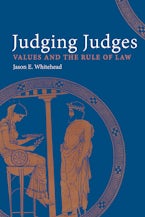Whitehead uses extensive interviews with appellate judges to delineate the ways that judges think about their task of interpreting the law. In doing so, he provides us with new insights and valuable evidence about the role of legal considerations in judicial decision-making.
~Lawrence Baum, Professor Emeritus of Political Science, Ohio State University
Jason Whitehead offers a nuanced analysis of the constraints that are imposed by the judicial role and the relatively limited range of choices that are open to judges when they interpret the law. This book is a tour de force and a model of scholarship. It can be read profitably by judges, legal theorists, and political scientists, indeed by anyone who is intrigued by the complexity hidden in the seemingly simple question, 'What does it mean to apply rules?'
~Malcolm M. Feeley, Claire Sanders Clements Dean & Professor, Boalt Hall School of Law, University of California at Berkeley
Whitehead’s Judging Judges brings together those testy siblings, law and politics, in an insightful treatment of the core issues in law. It is passionate and careful, learned and savvy, and often very clever. Judging Judges is an accessible treatment of legal thinking that puts real people in the jurisprudential equation along with judges and lawyers.
~John Brigham, Professor, Political Science, University of Massachusetts, Amherst
Highly interesting work
~Choice
This is a must read book for those interested in the normative dimensions of the rule of law as well as those who wish to move beyond the stale debates between 'attitudinalists' and 'legalists' in the study of judicial behavior.
~Cornell W. Clayton, Law & Society Review
A well-honed exploration of a thorny and complex issue marked by rigor in analysis.
~Justice Gilles Renaud, Canadian Law Library Review
Whitehead seeks to better define how judges sustain the rule of law, and to counter the suspicion that the only distinction between good and bad judging is the preference for a particular outcome...His discussion of judicial values would be a good supplement in undergraduate courses on judicial process, constitutional law, or legal reasoning.
~Keith J. Bybee, Law and Politics Book Review

